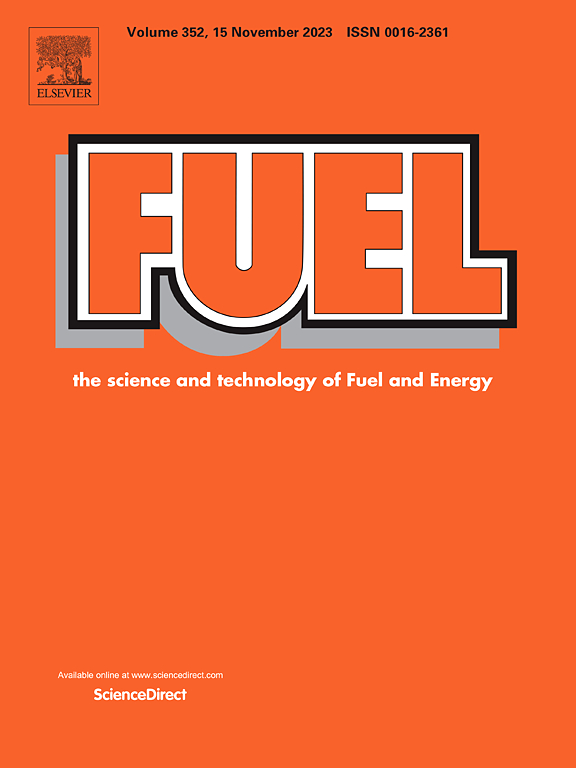Tuning e-fuel selectivity in sorption-enhanced CO2 hydrogenation over In2O3/ZrO2: The effect of LTA and FAU zeolites
IF 7.5
1区 工程技术
Q2 ENERGY & FUELS
引用次数: 0
Abstract
The e-fuels synthesis via CO2 hydrogenation and the Sorption Enhanced Reaction technology are captivating strategies for CO2 utilization and the integration of renewable energy sources. This study focuses on enhancing the conversion of CO2 over an In2O3/ZrO2 catalyst by incorporating LTA zeolites (3A and 4A) and a FAU zeolite (13X). Key operational parameters, such as temperature (T), Gas Hour Space Velocity (GHSV), type of zeolite, and Zeolite: Catalyst mass ratio (Z/C), were systematically varied. LTA zeolites (3A and 4A) provided the highest CO2 conversions. The introduction of a water-adsorbing solid into the reactor significantly altered the products yield and selectivity. While the selectivity towards CH4, CH3OH, and C2H6O appeared to lay on the type of zeolite, the selectivity towards CO remained unaffected. Zeolite 3A demonstrated the greatest enhancement in selectivity towards CH4 and CH3OH, whereas the synthesis of C2H6O was favored by zeolites 4A and 13X. The Zeolite:Catalyst mass ratio also played a crucial role in process performance, influencing both CO2 conversion and product selectivity. Increasing this ratio improved CO2 conversion and reduced CO selectivity under all operating conditions, while CH4 selectivity increased. However, the selectivity toward CH3OH and C2H6O exhibited an anomalous and complementary behavior. While a maximum was observed for DME, a minimum was registered in methanol production, suggesting a dependency of the dehydration reaction kinetics on the amount of water produced during the reaction.
In2O3/ZrO2吸附强化CO2加氢中电子燃料选择性的调整:LTA和FAU沸石的影响
通过二氧化碳加氢合成电子燃料和吸附增强反应技术是二氧化碳利用和可再生能源整合的诱人策略。本研究的重点是通过加入LTA沸石(3A和4A)和FAU沸石(13X)来提高In2O3/ZrO2催化剂上CO2的转化率。系统地改变了关键操作参数,如温度(T)、气体小时空速(GHSV)、沸石类型和沸石:催化剂质量比(Z/C)。LTA沸石(3A和4A)的CO2转化率最高。在反应器中引入吸水性固体,显著地改变了产物的收率和选择性。虽然对CH4、CH3OH和c2h60的选择性似乎取决于沸石的类型,但对CO的选择性不受影响。3A分子筛对CH4和CH3OH的选择性增强最大,而4A分子筛和13X分子筛则有利于c2h60的合成。沸石:催化剂的质量比对工艺性能也起着至关重要的作用,影响CO2转化率和产物选择性。在所有操作条件下,增加该比值可提高CO2转化率,降低CO选择性,同时提高CH4选择性。然而,对CH3OH和c2h60的选择性表现出反常的互补行为。在二甲醚中观察到最大值,而在甲醇生产中观察到最小值,这表明脱水反应动力学依赖于反应过程中产生的水量。
本文章由计算机程序翻译,如有差异,请以英文原文为准。
求助全文
约1分钟内获得全文
求助全文
来源期刊

Fuel
工程技术-工程:化工
CiteScore
12.80
自引率
20.30%
发文量
3506
审稿时长
64 days
期刊介绍:
The exploration of energy sources remains a critical matter of study. For the past nine decades, fuel has consistently held the forefront in primary research efforts within the field of energy science. This area of investigation encompasses a wide range of subjects, with a particular emphasis on emerging concerns like environmental factors and pollution.
 求助内容:
求助内容: 应助结果提醒方式:
应助结果提醒方式:


